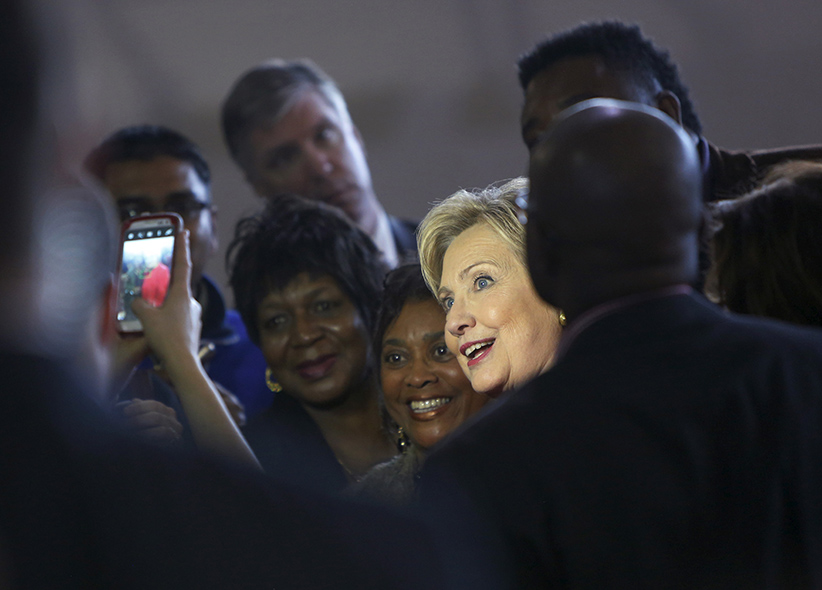Why black voters are saving Hillary Clinton: Inside a southern barber shop
Black voters might be the rampart that saves Clinton from a surprisingly strong Sanders push
Democratic U.S. presidential candidate Hillary Clinton greets supporters after a forum at Denmark-Olar Elementary School in Denmark, South Carolina, February 12, 2016. (Jonathan Ernst/Reuters)
Share

COLUMBIA, United States – In this African-American barber shop in the Deep South you can get a cut, a beard-trim, or a conversation about the athletic legends pictured on the wall: Muhammad Ali, Jim Brown, Jerry Rice.
There’s one thing you won’t easily find – someone voting for Bernie Sanders.
Hands shoot up around the room when customers are asked who’s supporting Hillary Clinton. When asked about her upstart challenger, however, the only thing moving inside Sports Talk Barbershop is an electric razor.
In an important story of the U.S. presidential primaries, black voters might be the rampart that saves Clinton from a surprisingly strong Sanders push.
It happened over the weekend in Nevada. Clinton’s four-point margin of victory would have vanished without her dominance among African-Americans. Three-quarters supported her. She’s counting on a similar dynamic in upcoming states with a strong black presence: South Carolina, Georgia, Alabama and Tennessee.
Barber-shop owner Keith Amos estimates that 98 per cent of his customers who express a political allegiance are Democrats. Most are voting for Clinton – although not necessarily with tremendous enthusiasm.
”If Bernie Sanders was 15 years younger, her ass’d been gone a month ago,” he says of the former secretary of state. ”(Sanders) looks like somebody’s great-granddad.” One female customer adds: “I don’t know if he’s gonna make it through the speech.”
That’s the first factor Amos detects: the age gap.
The other thing is, African-Americans here fear losing to Republicans. GOP candidates are all vowing to undo Barack Obama’s legacy – and that causes consternation among people who take pride in it.
Amos says the president’s legacy is imperfect. In this conservative, God-fearing part of the country, he says lots of people turned off Obama when he approved same-sex marriage.
But he’ll never forget the joy of waking up the day after the 2008 election: ”Being from the South, when you’d say, ‘What you wanna be when you grow up, kid?’ (It’s always been), ‘I wanna be a basketball player. I wanna be a football player.’ But my son could say, ‘I wanna be president of the United States of America.’ Hey, Obama did it.“
Memories of the past ripple through the politics here. This is where Democrats started losing their generations-long hold on the South when, amid the civil-rights struggle, Sen. Strom Thurmond switched to the Republicans.
Those old battles even seep into the barbecue.
The rib joint across the street was owned by a famous segregationist. A big Confederate flag hung outside until a couple of years ago. While the owner’s children had it taken down, the folks in the barber shop haven’t forgotten.
Amos tells customers: If you must get takeout across the street, don’t bring it here. Don’t even bring the garbage. ”I don’t want his bags in my trash.”
A woman in the next-door hair salon says beating Republicans is a priority. There’s concern the septuagenarian socialist might not be up to the challenge.
A third factor works in Hillary Clinton’s favour: her husband.
”We love Bill,” said Nell Hall, a former soldier who styles hair next door.
”I wouldn’t mind having Bill back in the White House. As long as they put a chastity belt on him and keep the Viagra away, he’ll be all right.”
There’s awareness here the Clinton legacy wasn’t all good for African Americans. The mass-incarceration craze of the 1990s escalated on Clinton’s watch, with a tough-on-crime bill he signed, and that his then-first-lady wife promoted.
Amos is aware of the damage mass-imprisonment did to black families and communities, where the new drug laws were enforced far more rigorously than for whites.
He has a university degree in criminal justice.
”Bill Clinton had more black people incarcerated than any other president in history. He’s also the same guy who passed NAFTA – that took all of our jobs out of America.
”Sometimes you fall in love with the illusion.”
So what’s the illusion? Why are people still enamoured by the former first couple, and a former first lady who now promises to end the era of mass-incarceration?
Amos tried explaining it.
”He’s from the South. He ate barbecue. He ate fried chicken. He got sex in the Oval Office. He went on the Arsenio Hall Show and plays the saxophone in sunglasses.
”People were like, ‘Bill’s like us.’ He’s from a little town in Arkansas. His father was an alcoholic and drunk. He ate soul food ’til the cholesterol got so high he almost had a heart attack.
”We felt like Bill Clinton was our first black president.”
A younger employee next door doesn’t buy it.
She says people like Bill but she’d be the commander-in-chief – not him.
Also, Ara-Viktoria McKinney says she’s attracted to Sanders’ ideological consistency. In the millennial-hipster vocabulary, Sanders held left-wing views before they were cool – on the war in Iraq; on trade deals; and on more lenient drug laws, although he has a mixed voting record there.
She’s more optimistic about his general-election prospects than some friends and customers.
“They feel he can’t beat the Republicans. They really don’t believe Bernie can do this,” said McKinney, 27. ”I believe he can.“
It’s lonely on her side.
In the hair salon, four people raise hands for Clinton. She raises hers for Sanders.
Next door at Sports Talk Barbershop, Clinton wins 5-0.